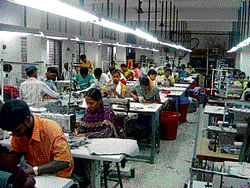
After hearing garment workers from across the country, the National People’s Tribunal on Sunday made out a case for immediate implementation of “living wages” in the Indian garment industry.
More than 250 garment workers from the major manufacturing centres of Bangalore, Tirupur and Gurgaon poured out their woes before the Tribunal during the two-day hearing which concluded here on Sunday.
The panel comprised Gianni Tognioni, Secretary General, Permanent People’s Tribunal, Italy; Coen Kompier, senior specialist on International Labour Standards, International Labour Organisation; Utsa Patnaik, economist; Marina Forti, senior journalist, Italy; Hemalatha Mahishi, senior advocate, Bangalore; and Mary E John, former director, Centre for Women and Development Studies, New Delhi.
“Testimonies were heard on forced unpaid overtime, inhuman productivity measures, systematic denial of social security payments, sexual harassment, gender discrimination and active suppression of the right to unionise,” a press release from the Tribunal said.
Based on these testimonies, the jury presented recommendations and immediate action plans directed to garment brands, suppliers, unions and government officials and towards starting a sustainable multi-stakeholder dialogue.
The jury stressed that living wage should be effectively implemented as a human right.
Essential components
“The components which are essential for the calculation of a living wage must not only include adequate food to the worker and her/his family, but all the elements of a life with dignity, housing, medical care and education for children, rest and leisure time,” the jury pointed out.
Further, the living wage must be periodically monitored and should take into account rapid changes in the cost of living and impact of the market.
It also stressed on the phenomenon of “wage theft” which includes non-payment for overtime, illegal deduction, late payment, wages to women lesser than men and wages not as per skill.
The Tribunal asserted that the Planning Commission and relevant financing authorities need to allocate sufficient resources to labour ministries to increase their capacity to enforce labour laws, monitor and inspect factories and adopt methods to tackle labour disputes.
Although all textile brands in India were invited, only H&M was present. Adidas group had provided a written statement, the release said.